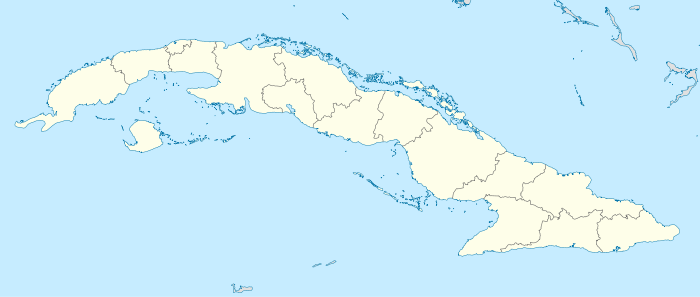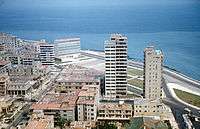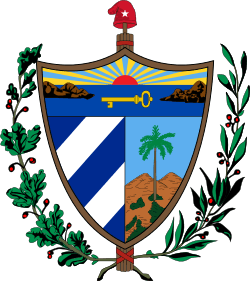Embassy of the United States, Havana
| Embassy of the United States, Havana | |
|---|---|
|
Native name Spanish: Embajada de los Estados Unidos de América La Habana | |
|
Chancery Building as seen during President Barack Obama's visit to Cuba. This used to be the US Interests Section of the Embassy of Switzerland in Havana, Cuba. Between 1977 and 2015, Switzerland was the protecting power of the United States in Cuba. | |
| Location | Havana, Cuba |
| Coordinates | 23°08′45″N 82°23′16″W / 23.14587°N 82.38765°WCoordinates: 23°08′45″N 82°23′16″W / 23.14587°N 82.38765°W |
| Embassy |
March 1953 – January 3, 1961; July 20, 2015 – present |
| Interests Section | September 1, 1977 – July 20, 2015[note 1] |
| Chargé d'affaires ad interim | Ambassador Jeffrey DeLaurentis (since 2014)[1] |
 Location of Embassy of the United States, Havana in Cuba | |
The Embassy of the United States of America in Havana is the United States of America's diplomatic mission in the Republic of Cuba. On January 3, 1961, US President Dwight D. Eisenhower severed relations following the Cuban Revolution of the 1950s.[2] In 1977, President Jimmy Carter and President Fidel Castro reestablished direct bilateral diplomatic relations with the Interests Sections Agreement that permitted each government to operate out of its former embassy in Havana and Washington D.C., which were called Interests Sections; they were prohibited from flying their respective flags. Cuban President Raúl Castro and US President Barack Obama restored full diplomatic connections on July 20, 2015.[3][4][5]
The building housed the United States Interests Section in Havana between 1977 and 2015, which operated under the auspices of the Swiss Embassy (acting as protecting power).[6] On July 1, 2015 it was announced that with the resumption of diplomatic ties, the building resumed its role as the U.S. Embassy in Cuba on July 20, 2015.[7][8][9][10] The embassy is led by Chargé d'affaires ad interim Ambassador Jeffrey DeLaurentis.[1][11]
History

The embassy was designed in the Modernist—Brutalist style by the architectural firm Harrison & Abramovitz. It is a long and six-story concrete and glass building, completed in 1953.[6] The gardens were designed by Californian landscape architect Thomas Dolliver Church. The contractor for the building was Jaime Alberto Mitrani, PE, also a professor of civil engineering at the University of Havana. The embassy complex is located directly on the Bay of Havana and the José Martí Anti-Imperialist Platform, in proximity to the Cuban Ministry of Foreign Affairs.
After the U.S. diplomatic mission became defunct in 1961, the building was not used by American personnel until the opening of the interests section on September 1, 1977.[6][12][13] In 1963, Prime Minister of Cuba Fidel Castro ordered the confiscation of the complex, but action was never taken by the Cuban government, though it still claimed right to the property in 2012.[14]
During the period that the complex served as an interests section, the U.S. was represented by Switzerland, and the Swiss maintained both the embassy complex and its effects. Renovations were completed on the complex in 1997. The building was upgraded from an interests section, and returned to its original role as the American embassy in Cuba on July 20, 2015.[7][8][9][15]
On August 14, 2015, U.S. Secretary of State John Kerry reopened the American embassy in Havana. Eight congressional lawmakers involved in the policy change also attended.[16][17][18] The three Marines who lowered the United States flag at the U.S. Embassy in Cuba 54 years ago presented another flag which was raised by the Marines assigned to the post.[19]
See also
Notes
- ↑ The U.S. and Cuba did not have bilateral diplomatic relations between 1961 and 2015. During this period, the U.S. diplomatic mission in Cuba operated under the auspices of the Embassy of Switzerland.
References
- 1 2 "DeLaurentis, Jeffrey". U.S. Department of State.
- ↑ United States severs diplomatic relations with Cuba History.
- ↑ "Obama moves to restored diplomatic relations at the embassy level on 2014. with Cuba". MSNBC. 2014-12-17.
- ↑ "Obama opens doors to Cuba after 56 years". USA Today. 2014-12-17.
- ↑ "U.S., Cuba restore ties after 50 years". Reuters. 2014-12-18.
- 1 2 3 History of the U.S. Interests Section in Cuba. United States Department of State.
- 1 2 "U.S. and Cuba to announce embassy openings". CNN. 2015-06-30.
- 1 2 "U.S. and Cuba to reopen embassies". Politico. 2015-06-30.
- 1 2 "US proposes US, Cuba reopen embassies as of July 20: Havana". Business Insider. 2015-07-01.
- ↑ "Cuban flag flies at embassy in Washington". USA Today. 2015-07-20.
- ↑ "Re-establishment of Diplomatic Relations Between the United States and Cuba" (PDF). United States Department of State. 2015-07-20.
- ↑ U.S. Interests Section Havana, Cuba. United States Department of State.
- ↑ Talking to the Bearded Man: The Swiss Mandate to Represent U.S. Interests in Cuba, 1961–1977. Graduate Institute of International and Development Studies.
- ↑ Havana's New York Accent. New York Times.
- ↑ "U.S. and Cuba Reopen Long-Closed Embassies". New York Times. 2015-07-20.
- ↑ Michael Weissenstein And Bradley Klapper (14 August 2015). "John Kerry in Cuba as flag raised over U.S. Embassy". Global News.
- ↑ Elise Labott, CNN (14 August 2015). "Kerry to reopen embassy in Cuba but tensions remain". CNN.
- ↑ Karoun Demirjian (14 August 2015). "Cuba congressional delegation: Who traveled with John Kerry to Havana". Washington Post.
- ↑ Gordon, Michael (14 August 2015). "Kerry Strikes Delicate Balance in Havana Trip for Embassy Flag-Raising". New York TImes. Retrieved 15 August 2015.
External links
| Wikimedia Commons has media related to United States Embassy, Havana. |
| Wikinews has related news: Embassy of the United States, Havana |
- Embassy of the United States, Havana on Facebook
- Embassy of the United States, Havana on Twitter

- United States Department of State: Cuba
- Embassy of the United States in Cuba (Havana)

.jpg)
